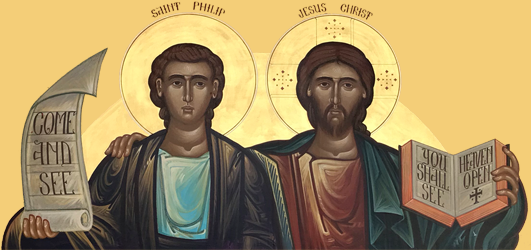“Hear, O Israel, the Lord our God is one Lord. You shall love the Lord your God from your whole heart, from your whole soul, and from your whole power.’” (OSB)
This passage, called the Shema (“Hear!”) by Jews, is one of the most consequential passages of Scripture for the revealed teaching about God, as we receive it within the life of God’s covenant people. The two primary revelations here concern 1) the nature of God, and 2) the nature of our response to God, that is, who God is and what it means to be human, created in God’s Image.
First, as Israel is about to enter the polytheistic and syncretistic milieu of pagan Canaan, God affirms His singularity. That God is “One” is no less a revealed understanding than the affirmation that God is “Three” first clearly revealed at Theophany, Christ’s Baptism in the Jordan. Israel is to worship the One (true) God, the God who has revealed Himself to Israel in concrete ways, in works of salvation, preservation, provision. This is the God they know, for He alone has drawn near to them and shown Himself to them. There is no reason to look elsewhere, for there is nothing “missing” in the God of the Exodus. There is no part, or experience, or dimension of reality that Israel can gain access to or can experience from some other “god,” for the God of Israel is in fact the Creator of all things and all peoples, who fills all heaven and earth by His power (Jer 23:24).
Second, as the second generation of Israel embarks on the Conquest of Canaan, they must be warned not to leave their “first love” (Rev 2:4). But again, what we have here is a revealed understanding. It is not “self-evident” that humans can, could, or should love God (or “the gods”). And yet that is exactly what God commands Israel to do. In this way God sets His relationship with Israel on a “hypostatic” foundation, the foundation of His own Person in loving relationship with Israel, of loving fatherly care reciprocated by loving son/child (Deut 1:31). In the following chapter, God will further reveal that it is His love for Israel, not Israel’s “merits,” that form the basis for God’s relationship (“election”) with Israel (Deut 7:6-11). To be sure, Israel’s love for God is to be expressed in their obedience to His commandments, but this obedience is not to be servile, demeaning, or coercive, but flowing from a relationship with God as loving Father.
It is in this connection between God as “One” and His loving, personal, fatherly relationship to humanity that we come to understand both how God is “Three” and humanity is made in God’s Image. If God is eternal, and God is personal, and God is love (1 Jn 4:16), then God in His Unity must also be an eternal, loving Communion of Persons, for love assumes an “object,” an “otherness” so as to share and express love. God the Father is the “One God” who eternally communicates the Divine Essence to the Son by Generation and the Holy Spirit by Procession, such that the Three Persons are One in Essence, united in an eternal loving communion. Into this Divine communion we humans are invited as His Image-bearers, there to find our true identity and goal, in the knowledge of and participation in our Creator.

